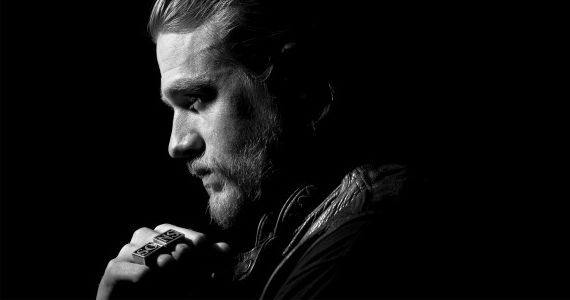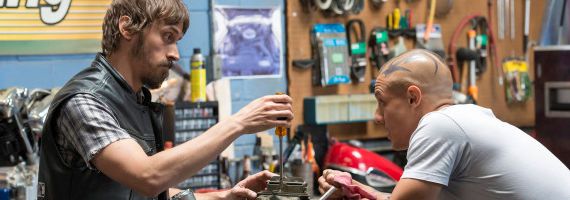One of the most interesting aspects of Sons of Anarchy is the way in which the show juxtaposes the relatively normal, almost banal domestic situations and environments of its characters with the oftentimes extreme and violently reckless aspects of their daily or "professional lives" (if they can be called that) without explicitly calling attention to the discordant nature of it all.
On one hand, there is a sense of jarring normalcy in the way these characters live – when they're not causing the kind of mayhem normally reserved for an afternoon spent lazily playing Grand Theft Auto – that's also an interesting facet of what the show does best: make its characters feel genuine, even if the situations they're routinely in are overly familiar or even outlandish. What stands out is how normal most of their homes appear to be, and how comfortable these individuals are existing inside them, as though they're wholly unaware that anything they're doing is out of the ordinary.
Looking inside the private lives of characters like Jax and Tara, it's clear that these aren't people trying to be hip or modern or chic (or, conversely live la vida SAMCRO 24/7). They are simple in their tastes, average even; they like what they like and make no apologies otherwise. Take for example the house that Clay and Gemma shared before they split, decorated in the style of a Midwestern housewife who just discovered the joys of shopping at Pier 1. It was all so average and expressive in its mundanity that it felt utterly convincing. And as a result, these characters lives, like their houses, began to feel impressively lived-in and, as is seen with Kim Dickens' laundry-folding madame Colette Jane, sometimes depressingly so.
But even with what little we know of Ms. Jane and her decidedly unglamorous and Peter Weller-protected brothel, Dickens manages to make her character feel instantly part of the Sons of Anarchy world – and not just by luring Jax into her bed. The same can be said for Donal Logue's terrific performance as the emotionally scarred and horrendously flawed Lee Toric. In fact, of all the issues the series has with regard to its endlessly recursive, Möbius strip of a narrative that never met a dead end it couldn't deus ex machina its way out of, the one thing that's difficult to complain about is the manner in which the characters and their lives feel so realized and how well the actors embody them.
It's a testament to the caliber of these characters that 'Straw' could use a divergent event to more thoroughly weaken the already thin barrier between the world of SAMCRO and the rest of Charming. By throwing in an element that feels potentially far more explosive (and possibly exploitative) than any of the more soapy elements the series has delved into in the past (crazy Irish kidnappers, anyone?), the season 6 premiere raises the question: How does the very specific and yet tangentially related violence of the episode touch upon the characters' lives and give meaning to their actions in terms of consequence?
For the most part, it seems as though the activities of SAMCRO have only touched upon the larger world of Charming and its surrounding areas in a direct fashion. But now, as the season premiere ends with a depiction of a horrific school shooting (which will no doubt generate considerable buzz and interest), the implication seems to be that the violence perpetrated on a regular basis by SAMCRO and its other associates has led, in some manner or another, to this event occurring. After all, the group has been in the gunrunning business for some time. In addition to the dismay visited upon Jax and Tara, or Clay and Gemma, or even Otto (if such a thing could be possible), the episode visits the horror upon all of Charming.
In essence, the consequences of their actions have been largely confined to being revisited upon themselves and the people with whom they associate/do battle with. Collateral damage has been an aspect touched on before – it was, to a certain extent, the reason behind Damon Pope's aggression against the club last season, but it has never felt as though there was some corollary between the rampant violence of the Sons and the community in which they are trying to preserve/rule.
As the series moves further into its third and (reportedly) final act, the start of the penultimate season looks primed to examine the more lasting and transformative effects of all its violence by introducing a more corrosive and far-reaching demonstration of it within the framework of the overall narrative. It's a far cry from asking whether or not the levels of violence – some of which simply comes off as violence for the sake of violence – will touch upon the character's lives in ways that may affect casting on the series; this event turns it into a more potent assessment of the true legacy of SAMCRO and the lingering gunrunning business that even Jax has kept going, though for reasons beyond simply making a buck.
How does this affect the characters who seem unable to reconcile their love of committing acts of savagery with the notion that they're ostensibly responsible for impressing upon another generation the idea that "might makes right" and that violence is the solution to any quarrel that may otherwise find them on the losing end? Can a show that sells atrocities and acts of violence as compelling portions of its narrative seriously add anything to the discussion of violence in popular culture without feeling like it's merely being gratuitous and exploitative?
Right now, the answers are unclear, but perhaps what's most important is that, with the end on the horizon, Sons of Anarchy has actually asked these questions at all.
_____
Sons of Anarchy continues next Tuesday with 'One One Six' @10pm on FX.
Photos: James Minchin & Prashant Gupta/FX



